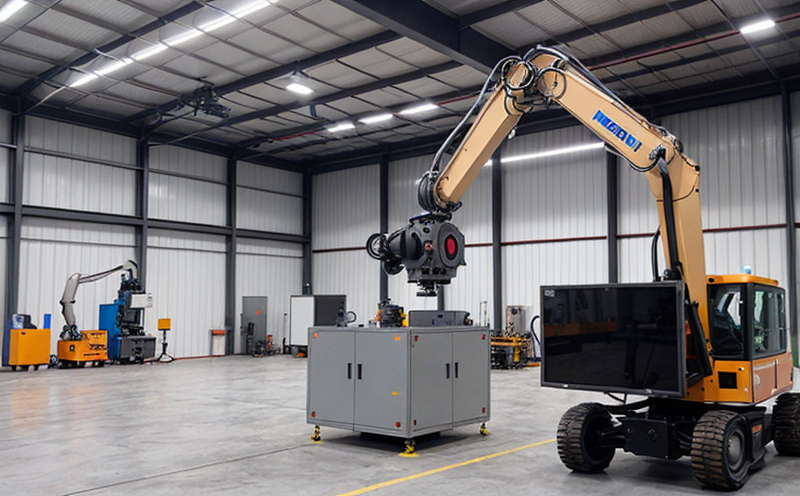ANSI RIA R15.06 Industrial Robot Safety Compliance Testing
The ANSI/RIA R15.06 standard is a comprehensive set of guidelines designed to ensure the safety and reliability of industrial robots in various applications. This standard provides specifications for the design, manufacture, installation, programming, operation, maintenance, and decommissioning of industrial robots.
Robots used in industrial settings perform critical tasks that can be dangerous if not properly safeguarded against potential hazards. ANSI RIA R15.06 focuses on preventing accidents by addressing risks such as contact with moving parts, electrical shock, and entrapment. Compliance with this standard ensures that robots are safe for human workers to interact with in shared workspaces.
The testing process under ANSI RIA R15.06 involves several key stages:
- Initial Design Review: Ensures the robot design inherently minimizes risks.
- Component Safety Testing: Validates that all components comply with safety requirements specified in the standard.
- System Integration Testing: Confirms proper integration of safety features into the overall system.
- Operational Verification: Checks how well the robot operates under real-world conditions to ensure it meets safety criteria during all phases of operation.
During testing, our laboratory uses advanced instrumentation and simulation tools to evaluate various aspects of robotic systems. These tests cover everything from static load capacity checks to dynamic motion analysis ensuring that every part of the robot performs safely within its intended environment. Our team also conducts comprehensive reviews of documentation provided by manufacturers including drawings, manuals, and other relevant materials.
Our expertise lies in understanding both the technical requirements laid out in ANSI RIA R15.06 as well as practical considerations from an industrial perspective. By combining these two perspectives, we provide accurate assessments that help our clients achieve full compliance while maintaining efficiency and productivity.
To better understand how this standard applies to your specific needs or projects involving industrial robots, feel free to contact us directly. Our experienced professionals would be happy to discuss potential solutions tailored specifically for your organization's requirements.
Industry Applications
The ANSI/RIA R15.06 standard is widely applicable across numerous industries where industrial robots are used extensively. Some key sectors include automotive manufacturing, electronics production, pharmaceuticals processing, food and beverage packaging, among others.
In the automotive industry, robotic arms play a crucial role in tasks such as welding vehicle frames or assembling complex components like engines. With increasing demand for precision and speed, it becomes essential to ensure that these robots operate safely alongside human workers without causing harm. The ANSI RIA R15.06 standard helps manufacturers meet this challenge by providing clear guidelines on how best to design and implement safety measures.
Electronics manufacturing benefits significantly from industrial robotics due to their ability to handle delicate components with high accuracy. However, handling these tiny parts requires precise control systems that must be rigorously tested against all possible failure modes before deployment. Again, compliance with ANSI RIA R15.06 ensures not only functional correctness but also robustness which enhances overall product quality.
Pharmaceutical companies rely heavily on automated processes to produce safe and effective medications. Robots used in these facilities must adhere strictly to strict hygiene protocols; any contamination could lead to severe health issues. Therefore, ensuring that robotic systems meet stringent cleanliness standards is vital for compliance with regulations such as ANSI RIA R15.06.
Food & Beverage packaging plants also utilize industrial robots to streamline operations efficiently while maintaining high levels of safety and hygiene standards. Robotic arms can precisely place products into containers or cases, reducing manual labor which might otherwise introduce errors or contamination risks.
Eurolab Advantages
At Eurolab, we pride ourselves on offering top-tier testing services that go beyond mere compliance. Our dedicated team of engineers and technicians brings extensive experience in industrial robotics coupled with deep knowledge about ANSI RIA R15.06 requirements.
We understand that achieving full compliance involves more than just running tests; it requires a thorough understanding of the underlying principles behind the standard. This approach allows us to provide valuable insights that not only meet but exceed regulatory expectations. Our advanced facilities equipped with state-of-the-art equipment enable precise measurements and accurate assessments, ensuring reliable results.
Our commitment to excellence is reflected in our unwavering focus on delivering timely services at competitive rates without compromising quality. We offer flexible booking options tailored specifically for your schedule, allowing you to plan your testing around other business commitments effectively.
Clients appreciate the personalized attention they receive from Eurolab’s staff who take pride in building strong relationships based on mutual respect and trust. Whether you're a small startup or an established multinational corporation, our goal is always to provide exceptional service that meets your unique needs.
Quality and Reliability Assurance
- Comprehensive Testing: We perform a full range of tests covering mechanical stability, electrical safety, emergency stop functionality, among others.
- Simulated Environments: Our labs can replicate real-world scenarios to simulate operational conditions accurately.
- In-depth Analysis: Post-testing analysis is conducted to identify any potential areas for improvement or further scrutiny.
- Document Review: We review all documentation submitted by manufacturers closely ensuring that every detail aligns with ANSI RIA R15.06 requirements.





